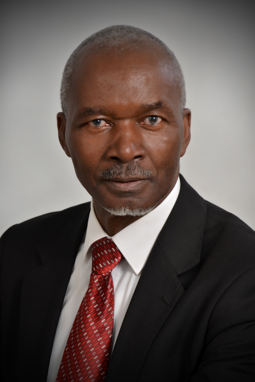| CTTM Home |
Professor Charles N Chunge
 Professor Charles Chunge was born in Kakamega in western Kenya. Despite starting school relatively late, he excelled in both primary and secondary school and went on to study Medicine at the University of Nairobi. He graduated with an MBChB in 1977. His first posting as a doctor was in Kisumu, after which he was transferred to Mandera in the far north-east corner of Kenya. For a while he was the only medical doctor serving a large region and gained impressive skills in clinical work as well as management. He also ventured into his first research work, testing a new treatment for scorpion stings.
From Mandera he was approached by Professor Mugambi to help start the Clinical Research Centre in Nairobi, a position which he accepted. As a result, he was offered a scholarship from WHO to study for a Masters in Medical Parasitology at the London School of Hygiene and Tropical Medicine (LSHTM) from 1980 to 1981. During his year in London he met his future wife, Ruth, who was a classmate.
Professor Charles Chunge was born in Kakamega in western Kenya. Despite starting school relatively late, he excelled in both primary and secondary school and went on to study Medicine at the University of Nairobi. He graduated with an MBChB in 1977. His first posting as a doctor was in Kisumu, after which he was transferred to Mandera in the far north-east corner of Kenya. For a while he was the only medical doctor serving a large region and gained impressive skills in clinical work as well as management. He also ventured into his first research work, testing a new treatment for scorpion stings.
From Mandera he was approached by Professor Mugambi to help start the Clinical Research Centre in Nairobi, a position which he accepted. As a result, he was offered a scholarship from WHO to study for a Masters in Medical Parasitology at the London School of Hygiene and Tropical Medicine (LSHTM) from 1980 to 1981. During his year in London he met his future wife, Ruth, who was a classmate.
On his return to Kenya in late 1981, he continued his work as a Clinical Research Scientist, and the fledgling Clinical Research Centre was transformed into the newly established Kenya Medical Research Institute (KEMRI). During his years in KEMRI, from 1982 to 1986, he carried out extensive clinical, field and laboratory research in tropical diseases such as leishmaniasis. schistosomiasis, malaria, amoebiasis, among others. In 1986 he was appointed as a Senior Lecturer in the Department of Medical Microbiology in the Medical School at the University of Nairobi, where he left his mark as a popular and effective teacher of Parasitology. In 1989 he was awarded a PhD from the University of Nairobi for his work on discovering a new treatment for leishmaniasis, which later became the gold standard. He left the faculty for nearly 2 years on a scholarship to McMaster University in Canada from 1989 to late 1990, where he gained another Masters degree, in Clinical Epidemiology and Health Economics. Over the years he published many articles in peer-reviewed journals and became a leading authority on clinical parasitology and tropical medicine in Kenya.
In 1994 he embarked on launching a company for private practice. Together with his wife he established a clinic which grew into the Centre for Tropical and Travel Medicine (CTTM), which has gained reputation as a specialized centre for travel vaccines, diagnosis and treatment of infectious and tropical diseases. He continued many projects outside the practice too, gaining recognition from the United Nations for a typhoid vaccination programme. In 2009 he was made a Fellow of the Faculty of Travel Medicine (FFTM RCPS) in the University of Glasgow, Scotland.
In 2015 he was appointed as an Executive Dean of the newly created School of Medicine in the Masinde Muliro University of Science and Technology (MMUST) in his home town of Kakamega. The appointment gave him simultaneous professorship. His task was to start the school from scratch and admit students to study medicine. By the time his 5-year contract had ended, in late 2020, the first batch of students were beginning their 3rd year of studies. During his tenure in Kakamega he also founded WECOHAS, a community organization created to improve local healthcare and encourage community enterprise. He continues to see patients at CTTM and to serve on various committees in an advisory capacity.
Publications
He has very many scientific publications, the most recent being:- The description of Acute Schistosomiasis (Katayama Syndrome) among travellers to Mwanza, Lake Victoria (J Travel Med 2011; 18: 408-410). This article is sometimes referred to as the MWANZA PHENOMENON.
- Chunge R and Chunge CN, Comments on the successful treatment of Blastocystis spp. with Paromomycin in Kenya. East Afr Med J. Vol: 93 No. 12 December 2016.